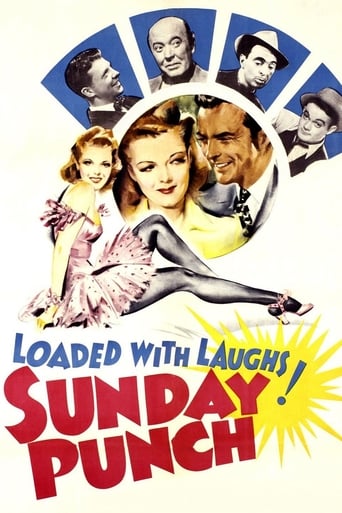marcslope
Metro trods a Warners-like path in this boxing B, trafficking in the ring and the underclass, and even importing Warners contractee Guy Kibbee,as a down-and-out manager who uncovers a possible find in a young Dan Dailey, a Swede in a Brooklyn boarding house, populated entirely by boxers, until Jean Rogers moves in. She's the niece of Connie Gilchrist, who runs the joint, and besides being a looker, she has a nice Ann Sheridan-like toughness. Dailey, who's charming, Swedish Chef accent and all, woos her, but she's more drawn to his sparring pal Bill Lundigan,leading to the inevitable climax where the two have to have it out in the ring. It moves at a decent clip, and the dialog's tastier than in some other similar yarns, thanks to Fay and Michael Kanin. Some good character actors line the periphery, like Sam Levene and Rags Ragland, and Dailey and Lundigan punch and fake and feint well enough. A perfectly OK time-waster, it turns up now and then on TCM.
Neil Doyle
Sunday PUNCH was a B-film that played the lower half of double bills when released in 1942, pleasant enough fluff that was only passable as entertainment even then.But fans of WILLIAM LUNDIGAN got to see him in a starring role for a change and pretty JEAN ROGERS got a chance to show that she was someone to watch even if her career never got into high gear. She's photographed with beautiful, glossy MGM close-ups, the kind usually reserved for their top stars, but none of the familiar material here is up to the standards of an A-film.Not even with a supporting cast that includes GUY KIBBE, CONNIE GILCHRIST, LEO GORCEY, SAM LEVENE and, in an unusual character role as a Norwegian janitor who wants to become a fighter, DAN DAILEY (billed as Dan Dailey, Jr.), as a guy who has a "Sunday punch" as his ticket to a boxing career. The fight scenes are standard stuff and neither Lundigan nor Dailey looks as though they could go more than two rounds in an actual fight.Summing up: A pleasant enough trifle, but nothing to get excited about.
David (Handlinghandel)
The mystery is: Why on earth did I watch it to the end? It's really awful, especially considering the screenplay by a noted writer, good photography, a director who was to do some good things, and several engaging players.Connie Gilchrist is extremely unbelievable as a Scandinavian landlady. And Dan Dailey, if anything, tops her as the "yanitor" of her building, Olaf. Jean Rogers, an intriguing actress with a mezzo voice, is Gilchrist's niece "Yudy." And with Yudy -- Judy, that is, of course -- comes trouble.See the boxers are in training and aren't supposed to see women.William Lundigan is one of the building's tenants. He is a medical school dropout whose boxing. With Dailey and Lundigan, moviegoers of the time got to see quite a bit of beefcake.Nothing about the movie rings true. Many decent performers are wasted.
boblipton
The photography in this movie is beautiful. That is the first thing you notice. Paul Vogel lights this in high contrast shadows, so much so that you think you're looking at a film noir as shot by Hurrell. The actors are all deep in character: even Guy Kibbee is restrained and excellent. But there are so many odd decisions here -- Dan Dailey equipped with a fake Norwegian accent, William Lundigan, as stiff as a washboard, Jean Rogers predatory *and* whiny, plus Rags Ragland and Leo Gorcey as comedy relief -- that is to say intended comic relief.The issue is that this is an effort to do STAGE DOOR at a boxing gym, and someone -- probably the producer -- insisted on adding gloss to every shot. And whoever did the final screenplay seems to have been working from a novel from which he hated to cut any character.Director Millar had a long and spottily distinguished career. His last effort was a TV Movie titled GOLDIE AND THE BOXER GO TO Hollywood in 1981. Sounds a lot like this one.


